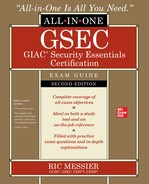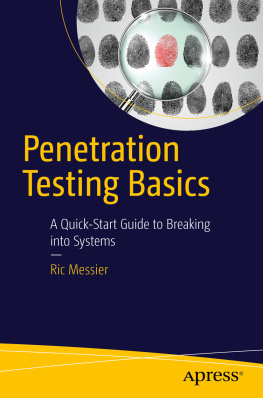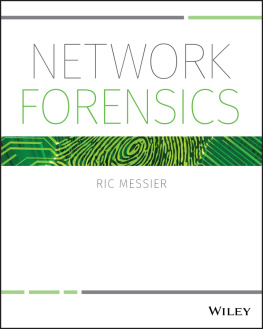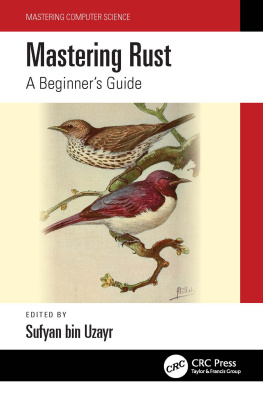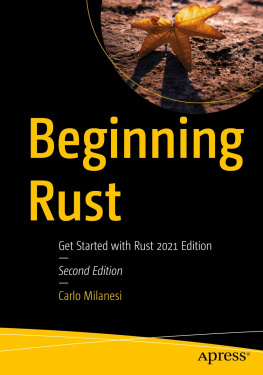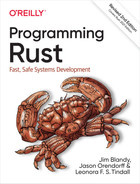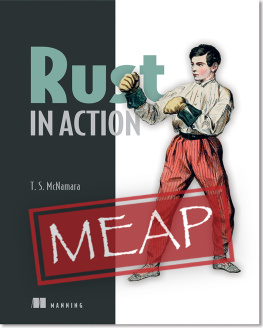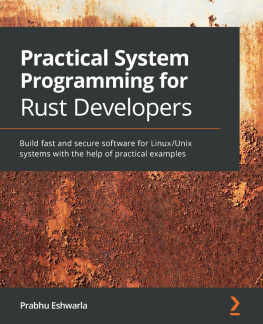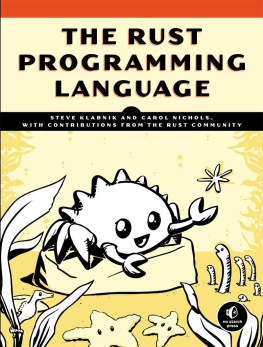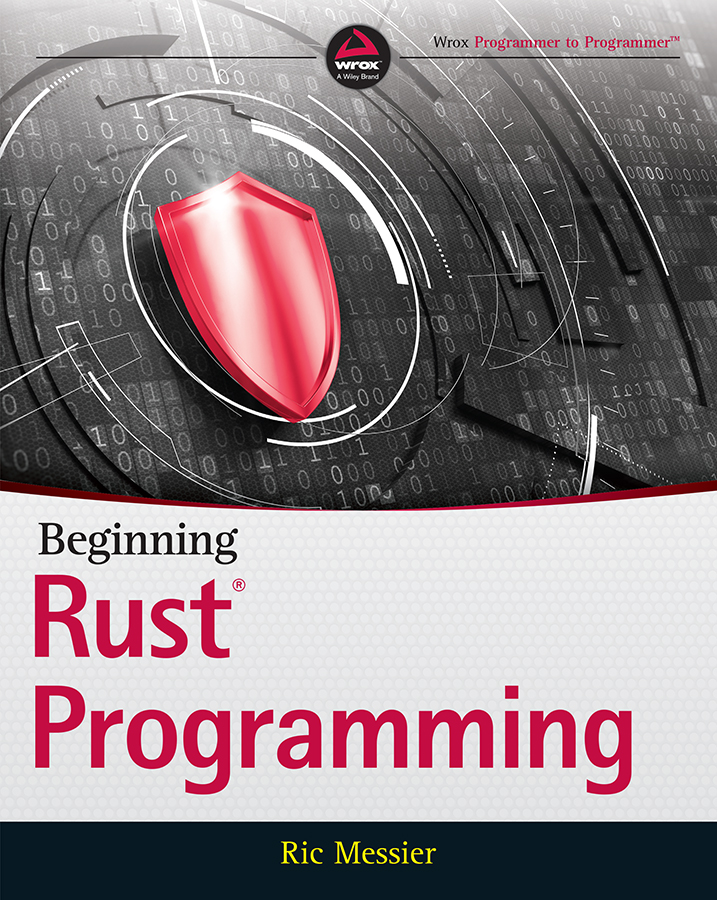
Table of Contents
List of Tables
- Chapter 13
- Chapter 15
List of Illustrations
- Chapter 1
- Chapter 2
- Chapter 3
- Chapter 4
- Chapter 5
- Chapter 6
- Chapter 7
- Chapter 8
- Chapter 9
- Chapter 10
- Chapter 11
- Chapter 12
- Chapter 13
- Chapter 14
- Chapter 15
Guide
Pages
BEGINNING
Rust Programming
Ric Messier

Beginning Rust Programming
Copyright 2021 by John Wiley & Sons, Inc., Indianapolis, Indiana
Published simultaneously in Canada
ISBN: 978-1-119-71297-8
ISBN: 978-1-119-71298-5 (ebk)
ISBN: 978-1-119-71287-9 (ebk)
No part of this publication may be reproduced, stored in a retrieval system or transmitted in any form or by any means, electronic, mechanical, photocopying, recording, scanning or otherwise, except as permitted under Sections 107 or 108 of the 1976 United States Copyright Act, without either the prior written permission of the Publisher, or authorization through payment of the appropriate per-copy fee to the Copyright Clearance Center, 222 Rosewood Drive, Danvers, MA 01923, (978) 750-8400, fax (978) 646-8600. Requests to the Publisher for permission should be addressed to the Permissions Department, John Wiley & Sons, Inc., 111 River Street, Hoboken, NJ 07030, (201) 748-6011, fax (201) 748-6008, or online at www.wiley.com/go/permissions.
Limit of Liability/Disclaimer of Warranty: The publisher and the author make no representations or warranties with respect to the accuracy or completeness of the contents of this work and specifically disclaim all warranties, including without limitation warranties of fitness for a particular purpose. No warranty may be created or extended by sales or promotional materials. The advice and strategies contained herein may not be suitable for every situation. This work is sold with the understanding that the publisher is not engaged in rendering legal, accounting, or other professional services. If professional assistance is required, the services of a competent professional person should be sought. Neither the publisher nor the author shall be liable for damages arising herefrom. The fact that an organization or Web site is referred to in this work as a citation and/or a potential source of further information does not mean that the author or the publisher endorses the information the organization or Web site may provide or recommendations it may make. Further, readers should be aware that Internet Web sites listed in this work may have changed or disappeared between when this work was written and when it is read.
For general information on our other products and services please contact our Customer Care Department within the United States at (877) 762-2974, outside the United States at (317) 572-3993 or fax (317) 572-4002.
Wiley publishes in a variety of print and electronic formats and by print-on-demand. Some material included with standard print versions of this book may not be included in e-books or in print-on-demand. If this book refers to media such as a CD or DVD that is not included in the version you purchased, you may download this material at booksupport.wiley.com. For more information about Wiley products, visit www.wiley.com.
Library of Congress Control Number: 2020937958
Trademarks: Wiley, the Wiley logo, Wrox, the Wrox logo, Programmer to Programmer, and related trade dress are trademarks or registered trademarks of John Wiley & Sons, Inc. and/or its affiliates, in the United States and other countries, and may not be used without written permission. Rust is a registered trademark of Mozilla Corporation. All other trademarks are the property of their respective owners. John Wiley & Sons, Inc., is not associated with any product or vendor mentioned in this book.
ABOUT THE AUTHOR
RIC MESSIER is an author, consultant, and educator who holds CCSP, GCIH, GSEC, CEH, and CISSP certifications and has published several books on information security and digital forensics. With decades of experience in information technology and information security, Ric has held the varied roles of programmer, system administrator, network engineer, security engineering manager, VoIP engineer, consultant, and professor. He is currently a Principal Consultant with FireEye Mandiant.
ABOUT THE TECHNICAL EDITOR
JESSICA ROCCHIO has been in the information technology industry for over a decade and is currently an incident response consultant at Mandiant. Over the last few years, she has worked with various programming languages. She has spent most of her career in incident response, forensics, intelligence, insider threats, and vulnerability management. Jessica has worked on a wide range of incidents, including espionage, cybercrime, fraud, data theft, and insider threats.
ACKNOWLEDGMENTS
Without my tech editor, Jessica, and my project editor, Kim, I might not have made it through this book, so many thanks to them!
INTRODUCTION
Save me from another hello, world book. Don't make me have to skim or skip through a half dozen chapters before I can get to something that's going to be useful to me. Or you, in this case. I can't tell you the number of programming books I've purchased over the decades, hoping to actually learn the language, only to end up just not using the book because it wasn't presented in a way that made a lot of sense to me. Instead of a dry explanation of how the language is constructed so you can try to put it all together in meaningful ways yourself, the purpose of this book is to jump straight into writing hopefully interesting or useful programs. Once we have the program, we can take a look at how it's constructed. You'll be learning by doingor learning by example, if you prefer. I hope you'll find this a more useful and practical way of learning Rust.
Rust is an interesting language, as it turns out. Like so many other languages, it claims a C-like syntax, which is roughly correct but misses out on many important elements. Where Rust really shines is where C has introduced bad behavior in programming practices. This is more apparent as more have been using C as a language. Where C provides you with the gun and the bullets to shoot yourself in the foot, Rust provides you with necessary protections to keep you from injuring yourself or, from the perspective of the application, keeps the application from crashing. Rust is focused on protecting the memory space of the program, in part to provide a better ability for concurrent programming. After all, Rust is considered to be a systems programming language, meaning it is intended for applications that are lower level than those that a user directly interacts with.
In addition to protections provided to the programmer, Rust has a reasonably active community that can be used not only for support but also to get additional functionality for your programs. There are a lot of third-party libraries. These libraries can make your life easier by introducing you to functionality without you needing to write it yourself.
The idea behind this book is to introduce you to Rust in context, rather than via snippets that, by themselves, don't work. You need all the surround to fully understand what is happening in the program. You'll find this out when you are looking at example code sometimes. This is true with the Rust documentation: it's like you need to fully understand the language to understand the examples you are looking at. This book doesn't take that approach. It assumes that you don't know the language, so every line in every program is explained in as much detail as is necessary to pull it all apart, since Rust can be a dense language in some ways. This means single lines can pack a lot of meaning and functionality.
Next page

